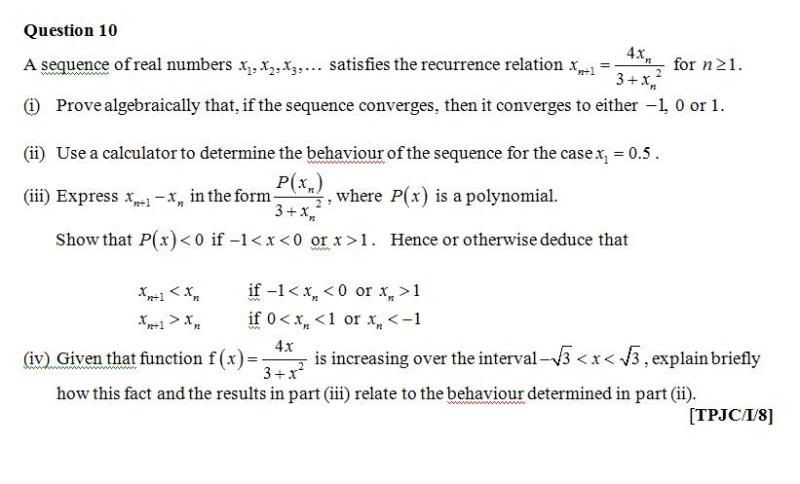H2 summation question
-
Hi, I was doing my revision questions and bump into some problems on summation.
 ^Im not sure how to prove the second part.
^Im not sure how to prove the second part. ^ Not sure how to explain (iv)
^ Not sure how to explain (iv)
Thanks. -
Originally posted by Occam's Razor:
Hi, I was doing my revision questions and bump into some problems on summation.
 ^Im not sure how to prove the second part.
^Im not sure how to prove the second part.
 ^ Not sure how to explain (iv)
^ Not sure how to explain (iv)
Thanks.For the 1st one, I will type it out in words.
Since the 1st part has been proven,
Summation 1/ ( Square root r + square root (r-1) ) = square root n
One thing you must realise is that the bigger the denominator, the smaller the value.
Since ( 2 square root r ) is bigger than ( square root r + square root (r-1) ), the summation of 1/ (2 square root r ) must be smaller than the summation of 1/ ( Square root r + square root (r-1) ), hence the summation of 1/ (2 square root r ) must be less than square root n.
For the 2nd one, (iii) shown that when x is between 0 and 1, the next number in sequence will be larger than the previous one. (iv) also shown that f(x) is increasing between - (square root 3) and (square root 3).
Hence, this shown that x = 0.5, which is in (ii), will increase ( even if you do not calculate it out ), as 0.5 lies well within the requirements shown in (iii) and (iv).
In short, (iii) and (iv) shown what will happen in (ii).
I have always been lousy when it comes to putting such stuffs into proper sentences, so you will have to think about it for a while.
-
Hi,
Your explanations are clear enough, so do congratulate your effort :)
Cheers,
Wen Shih -
Ok thanks! :)
-
first question appeared in 2006 TPJC J1 Common Test :D
-
Hi, I have another question I'm stuck with.
Im not sure about the last part.
-
Hi,
When the question asks one to deduce, it means that the new summation can be expressed in terms of the original.
One practical strategy is to expand the new summation and see clearly how it is related to the original.
Note also that the sum of 1/2^r is a sum of GP.
Try it. Thanks!
Cheers,
Wen Shih -
Hi, I tried that method and came to a dead end.

-
Hi,
sum {1, n} [ (r - 1)^2/2^(r + 1) - 1/2^r ] = f(1) - f(n + 1), by the method of differences.
So sum {1, n} (r - 1)^2/2^(r + 1) = f(1) - f(n + 1) + sum {1, n} 1/2^r.
Now sum {1, n} (r - 1)^2/2^(r + 1) can be expanded into
0/2^2 + 1^2/2^3 + ... + (n - 1)^2/2^(n + 1), which can be re-expressed as
1/2^2 [ 1^2/2^1 + 2^2/2^2 + 3^2/2^3 + ... + (n - 1)^2/2^(n - 1) ] -- (1).
The new sum is sum {1, n} r^2/2^r, which can be expanded into
1^2/2^1 + 2^2/2^2 + ... + n^2/2^n -- (2).
Comparing (1) and (2), we see that
sum {1, n} r^2/2^r = 2^2 sum {1, n + 1} (r - 1)^2/2^(r + 1) yes?
Thanks!
Cheers,
Wen Shih -
Oh ok, never thought of doing it this way. Thank you very much :)
-
Hi,
That was what I meant by expansion :)
This strategy always works, because we can see patterns through concrete numbers. Thanks!
Cheers,
Wen Shih -
Dear students,
I have written a detailed article on the handling of summations which may be helpful in your problem-solving:
http://www.freewebs.com/weews/sequencesseries.htm
Thanks!
Cheers,
Wen Shih